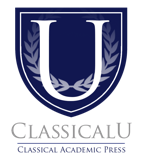Back to Course
Teaching Math Classically
0% Complete
0/0 Steps
-
Introduction
Teaching Math Classically—Introduction: How to Teach Mathematics Well (Preview Content) -
LessonsLesson 1: The State of Math Education in America (Preview Content)3 Topics|1 Quiz
-
Lesson 2: How to Improve Math Education in the US (Preview Content)3 Topics|1 Quiz
-
Lesson 3: The Trivium and Mathematics Education3 Topics|1 Quiz
-
Lesson 4: The Grammar of Mathematics3 Topics|1 Quiz
-
Lesson 5: Mathematics, Memory, and Retained Learning3 Topics|1 Quiz
-
Lesson 6: Cultivating a Reflective and Collaborative Faculty3 Topics|1 Quiz
-
Lesson 7: Strategies for Reforming a Math Program3 Topics|1 Quiz
-
Lesson 8: Teaching Math with Socratic Dialogue—Part 13 Topics|1 Quiz
-
Lesson 9: Teaching Math with Socratic Dialogue—Part 23 Topics|1 Quiz
-
Lesson 10: Rhetoric in the Mathematics Classroom3 Topics|1 Quiz
-
Lesson 11: Taking a Liturgical Audit3 Topics|1 Quiz
-
Lesson 12: Constructing Mathematical Arguments3 Topics|1 Quiz
-
Lesson 13: Mathematical Proofs Students Should Know2 Topics|1 Quiz
-
Lesson 14: The Beauty of Math and Poetic Instruction3 Topics|1 Quiz
-
Lesson 15: Teaching Math as Storytelling3 Topics|1 Quiz
-
Lesson 16: Essential Elements for Teaching Math2 Topics|1 Quiz
-
Lesson 17: Mathematics as a Humanities Subject4 Topics|1 Quiz
-
InterviewsInterview: Andrew Elizalde on Math Education
-
Interview: Andrew Elizalde on How He Became Interested in Mathematics1 Topic
-
Interview: Andrew Elizalde on His Journey into Classical Education1 Topic
-
Interview: Bill Carey on Teaching Math Classically
-
End of Course TestEnd of Course Test: Teaching Math Classically1 Quiz
Lesson 8,
Topic 3
In Progress
Discussion Questions
Lesson Progress
0% Complete
- The first priority for comprehensively refining a math program, Andrew says, must be to establish a reflective, collaborative, and professional culture at your school. What obstacles to establishing this culture do you anticipate encountering where you teach? What specific strategies from this lesson could help? How could you be instrumental in implementing them?
- How was your own educational experience different from the one you are cultivating in your school? If it was very different, have you found it difficult to adjust as you learn new teaching methods and ideas? How has finding ways to modify your own educational approach helped you assisting parents new to the system?
- What international best practices or teaching reform protocols most appeal to you? Describe any experiences you have had with them, either in workshops or in professional practice. Which would work best at your school, and how can you work to reproduce them more fully there?
- What are some ways you can promote your school’s “math nerd” culture? What activities or clubs can you launch to bring “recreational mathematics” to the notice of more students?


